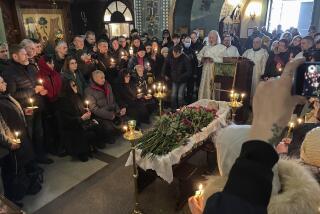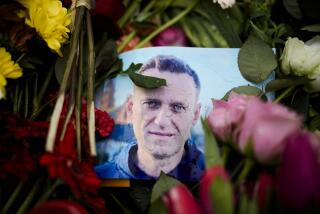Romanov Prince Hopes Russia Looks to Future
- Share via
ROUGEMONT, Switzerland — When he stepped off the plane in the country he knew only from books, Prince Nicholas Romanov felt he was home.
“I had a clear feeling that I was in my fatherland,” he recalls from his first visit to Russia four years ago.
Seventy-five years earlier, the Bolshevik Revolution had ended three centuries of Romanov rule over an empire covering a sixth of the Earth.
Czar Nicholas II and his family were slain, along with 10 other Romanovs. Those who managed to escape the executioners went into exile.
French-born Prince Nicholas, 74, is recognized by most members of the extended Romanov family as head of the imperial house. But he isn’t looking to gain the throne. Indeed, he says he opposes the very idea of monarchy.
“It would not solve any of the frightful problems facing Russia,” he said in an interview at his home in this alpine resort. “And there is no constitutional mentality in the country. A monarch in Russia would be bound to become an autocrat and he would not necessarily be intelligent.”
A lover of history who is working on a set of biographies of Russian nobility, Nicholas wants Russia to leave its bloodstained past behind and look to the future.
He says a historic step in that process will be the planned reburial of the remains of the last czar and of those slain at his side in the city of Yekaterinburg in 1918.
The ceremony is to take place at St. Petersburg’s Cathedral of St. Peter and St. Paul, resting place of all czars since Peter I. But it seems the nine skeletons dug up five years ago in a forest near Yekaterinburg will remain in a morgue for the time being.
Nicholas said Russian officials have sent word that more time is needed for a special government commission to verify the identities of the remains.
He questions that explanation, noting British and American scientists already identified the remains of the czar, his German-born wife and three of their daughters by making genetic comparisons to the blood of living descendants. Missing are a fourth daughter and the czar’s only son, Alexei, whose bodies are believed to have been completely burned by their killers.
Nicholas speculates one reason for the delay may be some reluctance on part of the Russian Orthodox Church, whose Patriarch Alexy II would officiate at the reburial. In 1981, Czar Nicholas II was canonized as a martyr by the Russian Orthodox Church in Exile, a step not taken by the church in Russia.
The prince says he is satisfied the Russian government agrees that all nine skeletons, believed to include those of the czar’s personal physician and three servants, be buried together in the cathedral.
“My cousins and I have always felt that those who have been lying in a common grave for 70 years should not be separated,” he said. “Also, we Romanovs, and I hope many Russians, see the reburial as a very important step toward reconciliation.”
Nicholas said he has written Defense Minister Pavel Grachev urging that veterans of the Communist and anti-Bolshevik forces, who fought a bitter civil war, should stand together at the funeral to show there is no more enmity.
He said the ceremony also should include the defenders against the Nazis’ World War II siege of Leningrad, as St. Petersburg was known during the Soviet era. “They saved St. Petersburg and they should be there with their Orders of Lenin and Red Banner on their chest.”
Nicholas, who is married to an Italian countess and is fluent in four languages, seems entirely happy living a private, modest life. The couple, who live off income derived in part from vineyards in Italy, make their home in an apartment in Rougemont and drive an old compact car.
Sitting down with a reporter in a studio filled with books on Russia, the prince said his first visit to his family’s homeland in 1992 “was neither traumatic nor dramatic.”
“I immediately felt very much at home. Of course, I liked seeing the old white, blue and red flag of Imperial Russia. But I would also have accepted a red flag with hammer and sickle. I always respect history,” he said.
Nicholas now has an Italian passport after traveling for most of his life with the papers of a stateless person.
With a laugh, he recalled applying for his first visa to the United States in the 1960s: “I had to swear that I was not a member of the Communist Party.”
More to Read
Sign up for Essential California
The most important California stories and recommendations in your inbox every morning.
You may occasionally receive promotional content from the Los Angeles Times.













